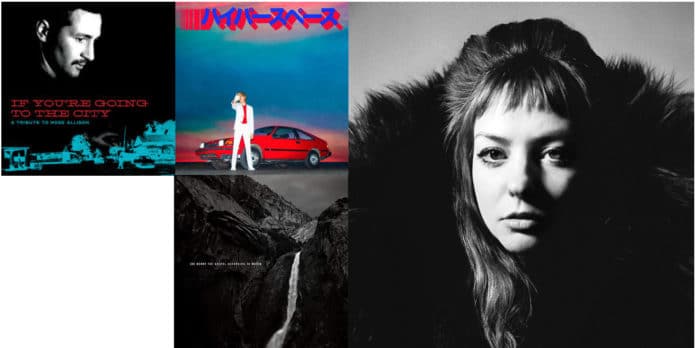Joe Henry “The Gospel According to Water” (Ear Music). Joe Henry has always had stories to tell. Sometimes these stories are told through metaphors, such as on “Our Song” from his excellent 2007 album Civilians, where he sings of seeing Willie Mays at a Scottsdale Home Depot store looking at garage door springs. Henry has always been one of my personal favorite recording artists/producers and one that I turn to for inspirational listening pleasure. The year 2018 was a bit different for Henry. The metaphors were different this time. He was diagnosed by his doctors, in the latter part of that year, with stage 4 prostate cancer. Thankfully, he is now fully in remission. On this, his 15th release as a solo artist, the collection of songs was recorded over a two-day period initially as demos. The songs document a period not about illness, but rather, as Henry says, “in love with life; lustily aglow.” There is an underlying theme of both love and spirituality on this collection of songs. This is a very intimate album with Henry sometimes alone on acoustic and electric guitars and at times joined by Patrick Warren on keyboards and piano, John Smith on acoustic guitar as well as Henry’s son, Levon, on alto sax and clarinet. The Birds of Chicago (JT Nero and Allison Russell) contribute harmonies of “In Time for Tomorrow” and “The Fact of Love”. One of my personal favorites from the album, “Orson Welles,” contains one of the most profound refrains of any of his songs to date: “Come the turn of the story, come the moving floor-/If you supply the terms of my surrender/then I’ll provide the war.” This is an album that embraces and celebrates our delicate lives. One that will grow on you after repeated listenings. It is simply a beautiful body of work. Key tracks are “Orson Welles,” “Bloom,” and “In Time for Tomorrow.”
Angel Olson “All Mirrors” (Jagjaguwar). Angel Olson’s voice can sweep from a shimmering whisper to a piercing wail. Olson returns with her fourth full length with this new release. Up until the release of this album, Olson was known more for leaning towards folk-rock. The orchestral strings and noir subject matter make this the singer-songwriter’s best and boldest record yet. As Olson puts it, her latest effort is “about owning up to your darkest side, finding the capacity for new love and trusting change even when you feel like a stranger.” The breathtaking songs are fleshed out by a 12-piece string section, creating a beautiful, grand, gestural sound. These songs were all originally written in isolation in the remote location of Anacortes, Washington to allude to the accrued weight of her identity at the time. In these songs, love and, consequently, her identity, became an illusion through the isolation. Eight of the eleven tracks feature the 12-piece string section. The dramatic musical arcs of the arrangements add to the granular textures of Olson’s songwriting. “All Mirrors” is a successful example of how being bold and staying true to yourself pays off. Key tracks are “Lark,” “All Mirrors,” and “Summer.”
Various Artists “If You’re Going to the City: A Tribute to Mose Allison” (Fat Possum). This tribute record to the late great Mose Allison is a welcome sampling in support of the musician’s charity, Sweet Relief. Allison was Mississippi born, a farmer’s son, but college educated in engineering, economics, English, and philosophy. His book-learning helped influence his take on standard 12-bar blues arrangements. Allison famously blended the rough-edged blues of the Mississippi with the 1950s jazz of New York City. He was a misfit with feet planted in both the back country and the big city. Many know Allison most from The Who’s take on the Allison classic “Young Man Blues.” The Who’s singer Roger Daltrey belted out ”Well, a young man ain’t got nuthin’ in the world these days” on their famous album “Live at Leeds.” “Young Man Blues” remains one of the least likely sources of non-original Who material. Since his 1957 debut, Allison collected a catalog of wildly creative songs containing literate, simple yet often wry and dryly humorous lyrics, along with a reticent talk-sung delivery, that took a skewed look at society. That approach resonated and continues to inspire a wide variety of musicians. This 15-track benefit album is full of excellent renditions of Allison’s classic songs, delivered with all of these contributing artists’ own musical personalities. Key tracks are “Nightclub” (Ben Harper & Charlie Musselwhite), “Wild Man on the Loose” (Dave Alvin & Phil Alvin), “If You’re Going to the City” (Iggy Pop), and “Everybody’s Cryin’ Mercy” (Bonnie Raitt).
Beck “Hyperspace” (Capitol). Beck Hansen has always been a musical chameleon. He is equally comfortable writing and performing songs containing simple acoustic guitar accompaniment as multi-instrumental sonics. On this, his 14th record, he has put together a successful combination of both. Beck combines the exuberant studio mischief of 1996’s “Midnight Vultures” with the splendid introspection of 2002’s “Sea Change” to eccentric, genuinely compelling effect. Hyperspace is simply a space between places and an appropriate title for this collection of songs. This is essentially a breakup record from a relationship/marriage as was the career milestone “Sea Change.” This one was written and released after the breakup of a 15-year marriage to actress Marissa Ribisi. The record is heavy on low-key funk and bright synthesizer tones. The combination of these sonics is what makes “Hyperspace” so compelling. This is the best, most frank and adventurous thing Beck has done since “Morning Phase,” but with a far lighter touch in mood and musicality. The record’s 11 tracks contain multiple producers, but seven out of the 11 tracks are produced along with well-known hit maker Pharrell. There are also guest vocals from Coldplay’s Chris Martin and Sky Ferreira and the collaboration makes for a great record. Key tracks are “Uneventful Days,” “Everlasting Nothing,” and “Stratosphere.”






